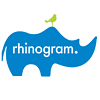
HealthTech Accelerator #5: Rhinogram bringing HIPAA-compliant texting system to physician-patient communications
 (EDITOR’S NOTE: This is another article in a series spotlighting the companies that are participating in the inaugural “HealthTech Accelerator” sponsored by CO.LAB, Erlanger Health System and Unum. “Demo Day” is June 5. To register, click here.)
(EDITOR’S NOTE: This is another article in a series spotlighting the companies that are participating in the inaugural “HealthTech Accelerator” sponsored by CO.LAB, Erlanger Health System and Unum. “Demo Day” is June 5. To register, click here.)
By Tom Ballard, Chief Alliance Officer, PYA
What’s your favorite form of communication? Chances are it’s sending and receiving text messages, according to a recent Gallup poll.
In fact, 84% of patients would rather text with their provider than talk to them on the phone. Have you ever thought about the implications of texting as it relates to communication with your healthcare professionals? Probably not, although you can rest assured that any form of fairly open communication like texting is very important to them, particularly in terms of confidentiality required under the federal Health Insurance Portability and Accountability Act of 1996, better known as HIPAA.
That’s why you see more and more efforts by providers to encourage their patients to use a practice-specific portal for communication. Adoption or acceptance rates, however, are only about 20 percent, because portals don’t offer the convenience that texting does.
One of the participants in the inaugural “HealthTech Accelerator” sponsored by CO.LAB, Erlanger Health System and Unum is Rhinogram, a Chattanooga-based company founded about three and one-half years ago by Dr. Keith Dressler, a well-known Orthodontist and serial entrepreneur in the community. Secure, efficient and convenient communication between providers and patients is the focus of the start-up.
“Rhinogram grew out of his passion to put the patient first,” said Kathy Ford, President and Chief Product Officer of the company. The veteran of the healthcare industry – about 25 years with both larger companies and start-ups – joined Rhinogram a year ago to help lead its growth.
Ford explained to us in a recent interview that Dressler understood the desire of patients to communicate with him and his staff via texting, but also was very mindful of the privacy requirements of any covered information under HIPAA guidelines.
“He looked for a technology to buy, but did not find a satisfactory solution,” Ford said. “He decided to design and build his own.”
As described on its website, Rhinogram “enables a better patient experience by making remote healthcare possible, simplifying communication and minimizing interruptions with real-time, text-based patient engagement.”
To illustrate how convenient Rhinogram is, Ford told us about a recent experience she had with the flu. Knowing that she had just 48 hours to get a prescription for Tamiflu after the symptoms developed, Ford tried contacting her Primary Care Physician which involved leaving several voice messages. She received a return call when the flu-stricken Ford was asleep on one occasion. By the time she connected with the office, the 48-hour window had elapsed.
“If I could have only texted my symptoms . . .,” Ford lamented. The result was about a week out of the mix to recover from the flu.
“Our solution is helping both patients and their providers,” Ford notes. Patients can text anytime, and their healthcare professional can respond and even route a message to the right staff member to take action such as ordering Tamiflu in Ford’s case.
Patients expect the same convenience during their healthcare experiences they receive through services like Amazon, Uber and the like. Rhinogram is a viable option for healthcare providers looking to respond to this disruption occurring in healthcare.
How do providers retain existing patients and expand their base? How do those providers bring more efficiency to their operations to hold down costs? Ford says Rhinogram is an answer.
“It’s super-convenient for the patient and the provider,” she says. And, with the federal Centers for Medicare and Medicaid Services now permitting reimbursement for such a service, it has become an even more viable offering for a provider.
Rhinogram has more than 200 unique customers, defined as anything from a one-physician practice to a corporately-owned, multi-practitioner group. Those clients are in 43 states managing millions of patient messages securely.
Rhinogram serves ambulatory or outpatient centers and has clients in 24 different service lines or verticals in the space. Ford sees the “HealthTech Accelerator” as a way to move into the enterprise sector in a big way, not just with health systems like Erlanger or providers of employee benefits (disability, life and critical illness insurance) like Unum, but also with large retail operators.
“This is a ubiquitous platform,” Ford says. “It can serve any regulated company that needs a convenient way to communicate securely with its customers. It’s a billion-dollar solution in a trillion-dollar market.”
Like what you've read?
Forward to a friend!

